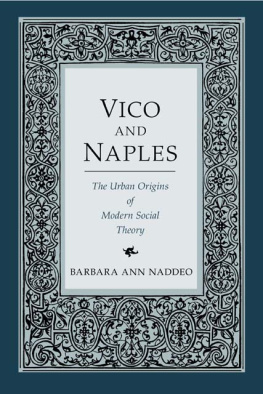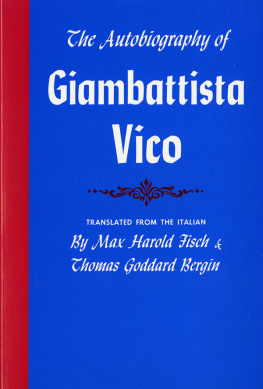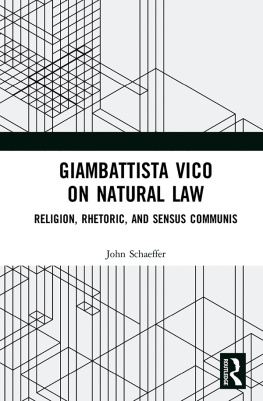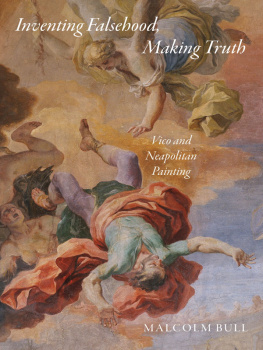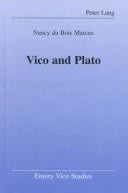Naddeo Barbara Ann. - Vico and Naples
Here you can read online Naddeo Barbara Ann. - Vico and Naples full text of the book (entire story) in english for free. Download pdf and epub, get meaning, cover and reviews about this ebook. publisher: Lightning Source Inc. (Tier 3), genre: Detective and thriller. Description of the work, (preface) as well as reviews are available. Best literature library LitArk.com created for fans of good reading and offers a wide selection of genres:
Romance novel
Science fiction
Adventure
Detective
Science
History
Home and family
Prose
Art
Politics
Computer
Non-fiction
Religion
Business
Children
Humor
Choose a favorite category and find really read worthwhile books. Enjoy immersion in the world of imagination, feel the emotions of the characters or learn something new for yourself, make an fascinating discovery.
- Book:Vico and Naples
- Author:
- Publisher:Lightning Source Inc. (Tier 3)
- Genre:
- Rating:4 / 5
- Favourites:Add to favourites
- Your mark:
- 80
- 1
- 2
- 3
- 4
- 5
Vico and Naples: summary, description and annotation
We offer to read an annotation, description, summary or preface (depends on what the author of the book "Vico and Naples" wrote himself). If you haven't found the necessary information about the book — write in the comments, we will try to find it.
Vico and Naples — read online for free the complete book (whole text) full work
Below is the text of the book, divided by pages. System saving the place of the last page read, allows you to conveniently read the book "Vico and Naples" online for free, without having to search again every time where you left off. Put a bookmark, and you can go to the page where you finished reading at any time.
Font size:
Interval:
Bookmark:
I. Introduction: Vicos Politics and the Political Origins of His Social Theory
In 1697 the civic political career of Giambattista Vico was stillborn. In that year, Vico competed for a position in the municipal government of Naples for which he qualified as a citizen of the capital, a title and identity that he proudly touted at the time. Indeed, that same year Vico prominently had signed his elegy on behalf of the deceased Catherine of Aragon as Giambattista Vico, Citizen of Naples, lending the luster of his civic qualifications to his yet modest literary credentials. Notwithstanding the tendentiousness of his Autobiografia, with his failure to obtain the post of Secretary of the City, Vico did set his sights on the University of Naples and successfully compete for a lectureship there, abandoning the more traditional avenue of municipal patronage for that of the state as a way to prosper in the capital.
For most of his long life, Vico was employed at the University of Naples as the professor of Rhetoric (16991741), Nonetheless, its award to Vico at the age of thirty not only acknowledged the growing reputation but also the political connections and allegiances of the young literatus. As the University of Naples was a public entity administered by the state, the award of the position in Rhetoric was a form of political patronage, which in the case of Vico recognized and rewarded his outstanding literary contributions to illustrious ceremonies of state wherein he honored the Spanish rulers of the Kingdom with an eloquence equal only to that of his unabashed obsequiousness.
In addition to his activities as a private tutor, prior to his university appointment Vico had accepted a number of commissions for ceremonies and publications celebrating members of the viceroyal court, for which he produced elegant hyperbolic works that evidently earned him both the respect and obligation of their sponsors and cohort. As Vico proudly noted in his Autobiografia (1725), in 1696 he had composed an oration praising the governance of Francesco Benavides, Count of Saint Stephan, the viceroy of Naples (168896) beloved by the Neapolitans, on the occasion of his departure. Needless to say, occurring just prior to his competition for the position in Rhetoric, these events provided Vico with ample occasion to demonstrate both his oratorical skill and, more important, his political allegiance to the Spanish before the leading members of the Kingdoms ruling class.
Once instated in the Chair of Rhetoric (1699) at the university, Vico nonetheless worked to maintain his public profile. Not only did he continue to frequent the circle about Caravita, who hosted an academy attended by distinguished local and Spanish men of learning, but he also secured membership in the most politicized of intellectual forums in Naples, namely, the newly established viceroyal academy, known as the Accademia Medinaceli. Presided over by no one less than the Duke of Medinaceli himself, on his admission to the Accademia Vico pronounced a lecture on the ancient Roman custom of feasting, a notably sociological reading of the Roman cena (supper) that was probably most compelling for its entertainment value. In short, at the outset of his career Vico strategically worked to win and cultivate the favor of the ruling caste of the Kingdom, be it by the art of baroque adulation or by the antiquarian indulgence of Roman bonhommerie.
Initially, on both the counts of eloquence and politics Vicos demonstration must have been quite convincing, as in 1702 he was commissioned by the viceroy of Naples, Marquis of Villena and Duke of Escalona (17027), to memorialize what were among the most delicate political episodes of the last decade of Spanish rule, first, the visit to the Kingdom of Philip V (17 April2 June 1702), the Bourbon heir to Charles II, whose succession to the Spanish throne was then in the process of contestation by the means of international warfare, Listed and elaborated on before his more famous philosophical works, Vico clearly considered the Panegyricus to be a key selling point of his career to the new Bourbon king, Charles (designated but not invested as VII ), who himself was the son of Philip V. In light of the outcome of Vicos request, his appointment as Royal Historiographer of the Kingdom, the Panegyricus presumably passed as evidence of services faithfully rendered to and well received by King Philip V during his contested reign over the Kingdom (17017). Indeed, in hindsight, Vicos praise of Philip V in 1702, that is just five years before he surrendered the Kingdom to imperial forces during the War of the Spanish Succession, easily lent itself as proof of unwavering loyalty to the Bourbon dynasty through both good times and bad.
However, as the omissions of the same vita suggest, Vicos track record was blemished, and the prominence granted the Panegyricus surely was also calculated to mitigate the poor publicity, if not outright disrepute, brought Vico by his subsequent commissioned work, namely, the history of the failed coup dtat directed against the regime of the Spanish viceroy, Medinaceli, in 1701. For the same vita, Vico cautiously omitted mention of the history, now conventionally entitled the Coniuratio principum Neapolitanorum (dated to circa 17034), although it presumably had been commissioned by Viceroy Villena and composed by Vico to apologize for the Bourbon succession to the Spanish throne and to discredit the purported ends of the Neapolitan insurrectionaries. While the exact objections of the censors to the publication of the history remain obscure, for those high-ranking servants of the Spanish crown, the Coniuratio clearly failed to persuasively defend the political status quo of the Kingdom and to respect the honor of its nobility. The viceroyal examiners also may have balked at Vicos representation of the political pretenses of the coups protagonists, pretenses that he implicitly was obliged to either denounce as illegitimate or politely neglect as ridiculous. In any case, for the likes of Giudice and Cantelmo, Vico had failed to deliver a history that could adequately serve the propagandistic ends of the Spanish on the ideological front of the War of the Spanish Succession.
For Vico, in turn, the censure of his history evidently was a source of immediate frustration and of lasting embarrassment. In the first place, he surely would not have accepted the commission of a history of such great political delicacy had he not been sure that he could succeed splendidly at the task and therewith benefit from it. Despite the plausible validity of the objections to the Coniuratio, furthermore, given his track record in 17034, he must have experienced the censorship of his history as a betrayal of his steadfast loyalty to Spanish rule of the Kingdom in its hour of supreme trial. During his drafting of the Coniuratio, Vico had continued to demonstrate unwavering public support for a Bourbon succession to the Spanish throne. Most notably, in his correspondence he adamantly defended the leading tract on the juridical propriety of the Bourbon succession penned by the prominent jurist Serafino Biscardi, who was then regent of the Kingdoms preeminent ministry, the Consiglio Collaterale, or Council of State, and perhaps the single most staunch ally of the Spanish in the Kingdom. For the Neapolitan coterie of philo-Spanish administrators, then, it was doubtless where Vicos political allegiances lay. Nonetheless, it was with mixed results that Vico publicly positioned himself as a staunch supporter of the Spanish Empire in the twilight of its Italian rule. Consequently, Vico not only omitted mention of the Coniuratio in his vita from 1734 but also covered over its tracks in his magisterial celebration of his intellectual career, the Autobiografia, which placed his philosophical works front and center.
Font size:
Interval:
Bookmark:
Similar books «Vico and Naples»
Look at similar books to Vico and Naples. We have selected literature similar in name and meaning in the hope of providing readers with more options to find new, interesting, not yet read works.
Discussion, reviews of the book Vico and Naples and just readers' own opinions. Leave your comments, write what you think about the work, its meaning or the main characters. Specify what exactly you liked and what you didn't like, and why you think so.

